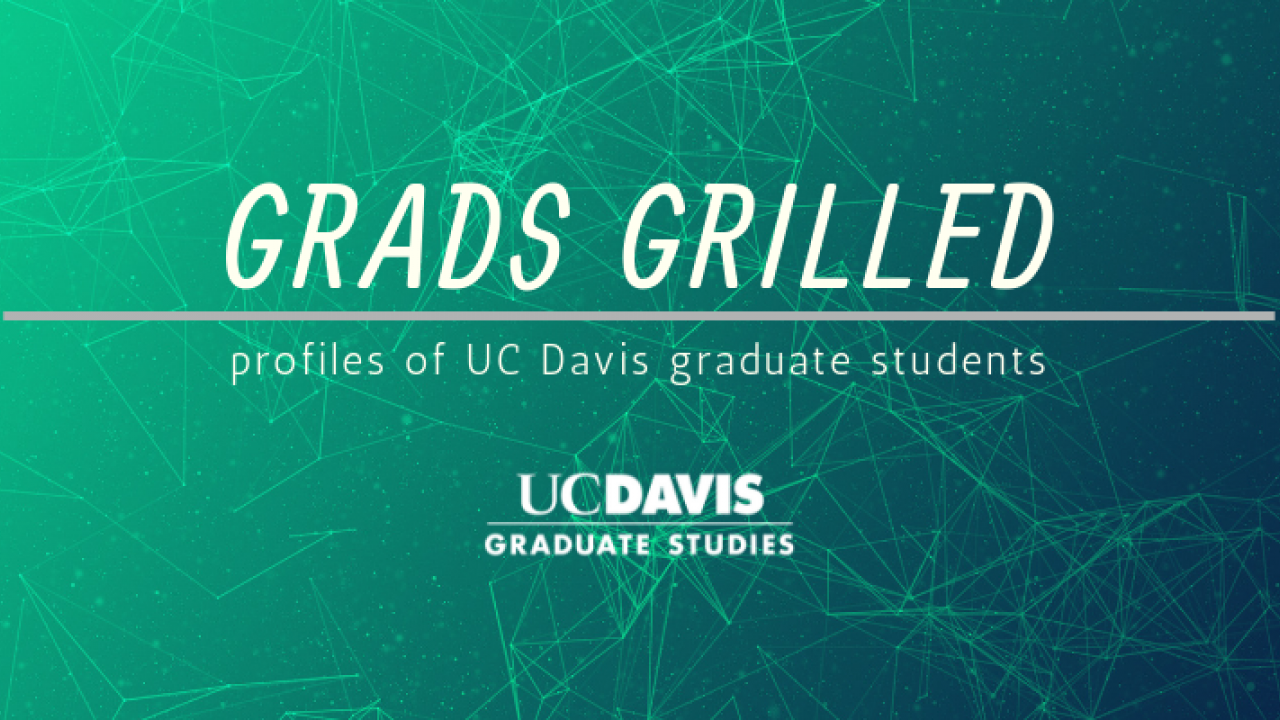
Graduate Student Profile: Nahrain S. Rasho, Political Science
Meet UC Davis Graduate Student Nahrain S. Rasho
- Department

Political Science
- Previous degrees and colleges
MA Global Politics, Loyola University Chicago
BA Political Science, University of Illinois, Chicago
- Where did you grow up?
I was born in Chicago, IL. I grew up in a north suburb of Chicago, Skokie, IL
- Where do you live now?
Sacramento, CA
- What's your favorite spot in Davis?
It really depends on the time of day. Since I tend to spend a lot of my time in Davis at cafes, I have to confess that my favorite spot is Cloud Forest Café on 3rd St. Delicious breakfast and lunch paninis, free Wi-Fi, and a variety of drinks!
- How do you relax?
Coloring, writing in my journal, and practicing meditation and yoga
- What was the last book you read for pleasure?
Reincarnation Blues: A Novel by Michael Poore.
- What TV show are you currently binge-watching?
I just wrapped up season one of Ozark on Netflix.
- Research interests
My research examines how federalism in Iraq affects Iraq’s smaller ethnic minority groups. I am generally interested in how political institutions shape dynamics between different domestic groups and how this dynamic can lead to group-based persecution, violence, and conflict. I believe political institutions shape the quality of social interactions between groups. I use Iraq as a case study to demonstrate how the institutional designers of Iraq’s 2005 constitution might not have accounted for the institutional effects on Iraq’s smaller communities. I explore how Iraq’s federal structure has influenced conditions for Iraq’s small and indigenous community: Assyrians.
- Dissertation title or topic
My title is not set in stone, but it would probably read something like this: Federalism in multicultural societies: How has federalism impacted Iraq’s smaller ethnic groups? An analysis on the consequences of Iraq’s federation on Assyrians, Yezidis, and Turkmens in Iraq
- Please share a surprising or noteworthy fact or finding from your research
My fieldwork in the Kurdistan Region of Iraq taught me that there is a lot that researchers don’t understand about what happens to smaller minorities living inside autonomous regions.
- Which professor or class inspired you to pursue graduate studies?
I was an assistant to an undergraduate class in political science on the politics of Tunisia at Loyola University Chicago. We traveled to Tunisia after the Arab Spring to learn about the effects of the uprising on local communities. I was a graduate student in global politics at the time. It was during this trip that I realized I wanted to specialize on politics in Iraq and hopefully host an undergraduate class in the field to offer students authentic exposure to Iraq’s societies.
- Which scholarly text do you wish you had written? Why?
I wish I had contributed to (not written) Minorities Within Minorities: Equality, Rights, and Diversity, edited by Avigail Eisenberg and Jeff Spinner-Halev. This is one of the few books that focuses on conflicts that arise between majority-minority groups. It would be great to contribute to this discussion by providing an application of this framework to an understudied area in the Middle East.
- What's the best thing about being a grad student?
Connecting with other graduate students who work within your field and learning more about other topics you typically don’t study through your relationships with your colleagues/peers.
- What's the worst?
The uncertainty about funding, where you’re going to work, and what you’ll be doing for work.
- If you weren't a grad student, what would you be doing?
I’d probably be working for a policy-based institute that worked on development and civil society in the Middle East.
- Finally, please ask yourself a question - "Where have you traveled this past year?"
Iraq, Turkey, Peru, Thailand. Up next, India :)
Graduate student profile courtesy of the UC Davis College of Letters and Science.
About Graduate Studies
Graduate Studies at UC Davis includes over 100 dynamic degree programs and a diverse and interactive student body from around the world. Known for our state-of-the-art research facilities, productive laboratories and progressive spirit – UC Davis offers collaborative and interdisciplinary curricula through graduate groups and designated emphasis options, bringing students and faculty of different academic disciplines together to address real-world challenges.
UC Davis graduate students and postdoctoral scholars become leaders in their fields: researchers, teachers, politicians, mentors and entrepreneurs. They go on to guide, define and impact change within our global community.
For information on Graduate Studies’ current strategic initiatives, visit the Graduate Studies strategic plan page.
